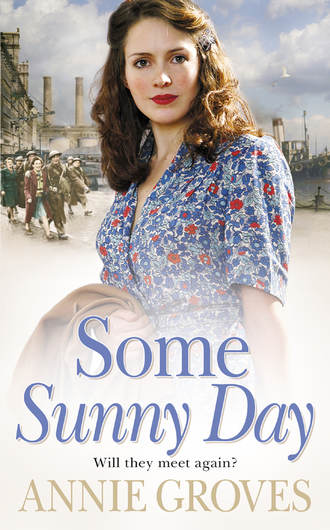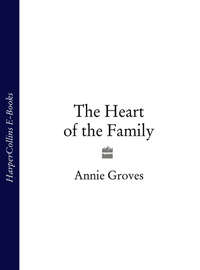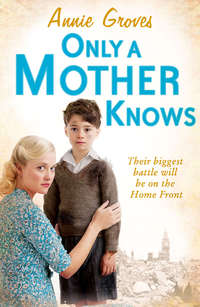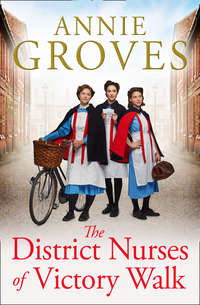
Полная версия
Some Sunny Day
The trouble had started, apparently, when Rosie’s father had taken his new fiancée to Liverpool to introduce her to his sister.
‘Acted like I was a piece of muck wot had got stuck to her shoe, she did, trying to show off wi’ her la-di-da way. If you ask me she never wanted yer dad to marry anyone. Mothered him she had, you see, Rosie, him being the younger and then him going spoilin’ her by giving her half his wages and allus bringin’ her stuff back when he came ashore. Of course she didn’t want him getting married and her gettin’ her nose shoved out of joint. Stands to reason. But your dad’s that soft he couldn’t see that. He thinks she’s perfect and she bloody well isn’t. I’ll bet that husband of hers were right glad to die and escape from her.’
Her mother had always been fond of making outrageous statements of this nature but Rosie had always dreaded her making them when her father was at home in case it sparked off one of their increasingly bitter rows.
‘Then you coming along didn’t help,’ her mother had informed Rosie bluntly, ‘especially when she saw how your dad took to you. She and that husband of hers never had no kiddies of their own and you’d have thought she’d have bin glad to have a little ’un in the family, but not her. Hates you almost as much as she does me.’
Her aunt certainly didn’t like her very much, Rosie was forced to admit. Whenever her father took her to visit, her Aunt Maude’s manner towards her was always cold and disapproving. There was none of the warmth in her aunt’s house that there was in the Grenellis’, even if there was more money. Not that the Grenellis were poor. Giovanni had worked hard for his family, and both his sons-in-law worked in his ice-cream business: small, plump Carlo, who was Sofia’s husband and Bella’s father, with his twinkling eyes and lovely tenor voice, and tall, good-looking Aldo, who spent his spare time like many of the Italian men at St Joseph’s Boxing Club, or in the room at the back of Bonvini’s shop with his fellow paesani, playing cards, and who was married to kind Maria. In the winter the men of the family, all skilled musicians, earned a living entertaining cinema queues and playing at Italian weddings and christenings.
The first thing Rosie noticed as she turned the corner into Springfield Street was the strange silence. The street was empty of the children who would normally have been playing under the watchful eye of their grandmothers. The caged singing birds, trained by some of the Italian families who had brought them from their homeland, were absent from open doorways and the doors themselves were firmly closed where normally they were always left open for friends and family. There were no voluble discussions on the merits of rival products from the women, no occasional mutters of deeper male voices belonging to the card players in the smoke-filled, wine-scented room at the back of the shop. And, most extraordinary of all, the shops themselves were closed – even Jimmy Romeo’s, as the grocery shop owned by the Imundi family was fondly known. Rosie stared at it in bewilderment. Jimmy Romeo’s never closed. On halfdays when other shops locked their doors and hung their signs in the window, and proud fathers walked with their sons to meet up with friends, Jimmy Romeo’s remained open for the men to play their favourite card games of scopa and briscola in the back room, and exchange banter. The street seemed almost alien without the familiar sharp smells of cheese, sausage, olives, coffee and garlic wafting through the open doorways. Something, not fear exactly, but something cold and worrying trickled down Rosie’s spine like the ice cream Dino Cavelli had deliberately dropped down the back of the taffeta dress Maria had smocked so carefully and lovingly for her to wear for her eleventh birthday party. Dino’s parents were close friends of Bella’s, comparaggio in fact, the name Italians gave to those very close friends they had honoured by inviting them into their family. As was the tradition, Dino’s parents had been compare and comare at Bella’s parents’ wedding, and were also Bella’s godparents, just as Bella’s parents were Dino’s. Rosie often envied Bella the security of the traditional Italian network of friends and family that surrounded her, although Bella complained that she found it restrictive and would love the freedom to go out with girlfriends that Rosie enjoyed.
Dino was a tall handsome young man now, and Rosie didn’t mind admitting that she rather enjoyed his flirtatious teasing whenever they happened to meet. Like her own father, he was in the merchant navy, and it always gave her a small frisson of excitement to see him walking down the street towards her when he was back on leave. So far she had resisted his invitations to go to the pictures with him, knowing all too well that he would not have dared to put such an invitation to an Italian girl. It was well known that young Italian men might enjoy a bit of dalliance with English girls but when it came to marriage they were too worried about their mamma’s feelings to do anything other than marry the girl of her choice – and she would always be a good Italian girl.
Not that she wanted to marry Dino – or indeed anyone right now. It was impossible for her to think of falling in love and being happy when the country was at war and so many dreadful things were happening. Her father was the kind of man who believed in protecting his family from the realities of what it meant to sail across the Atlantic, knowing that Hitler’s U-boats were waiting to hunt down and sink the merchant vessels that were bringing the much-needed supplies of food, oil and other necessities back to Liverpool. He might not say to them that each time he sailed he knew that every day he was at sea could be his last, but Rosie knew the truth. In February his ship had been late getting back into Liverpool, because one of the other vessels sailing with it had been torpedoed and sunk with the loss of most of its crew. Rosie had inadvertently overheard her father talking about it with some of the other sailing men from the area.
No, her father might not talk much to her about the dangers he and the other merchant seamen faced, but that did not mean that Rosie was not aware of them. She had felt indignant on her father’s behalf when she had learned that if a merchant ship was lost then the seamen were paid only for the number of days they had been on board it. If a ship was torpedoed and the men had to abandon it, they were paid nothing at all for the days, sometimes even weeks, it might take them to get back to port and find another berth.
Rosie had heard her Aunt Maude berating her father for not getting a shore job where he would be safe and better paid, but as easy-going as her father was, when it came to his work he could not be shifted. He had salt water in his blood, he was fond of saying, and the life of a landlubber was not for him.
Rosie crossed Christian Street into Gerard Street, a small smile curling her mouth as she thought of her father. The smile instantly disappeared the moment she heard angry raised voices, followed by the sound of breaking glass. Half a dozen or more men had suddenly appeared at the far end of the street, some wielding heavy pieces of wood, and yelling out insults and threats as they smashed in the window of an ice-cream shop. As Rosie watched, paralysed with fear, more men joined those attacking the shop, and then several started to march up the street, one of them stopping to throw a brick through a house window, whilst others banged on doors and called out insults. Above the yells of the attacking mob and the sound of glass being trodden underfoot, Rosie could hear a woman screaming and a baby crying. Rose Street police station was only five minutes away. If she ran she could be there in less, Rosie decided, her heart bumping against her chest as she hurried off.
Fortunately she didn’t need to go all the way to the police station, because she met several policemen coming towards her. One of them was their local bobby, Tom Byers, whose son had been at school with Rosie and Bella.
‘There’s a gang battering down Gonnelli’s ice-cream shop,’ Rosie told him breathlessly. ‘I could hear a baby crying …’
‘You get yourself off home, and make sure you stay there, young Rosie,’ Tom told her grimly, straightening the chinstrap of his helmet, his usually friendly face looking very stern. ‘It isn’t safe for you to be out with these young hotheads on the loose, creating trouble for decent honest folk.’
‘What’s happening to … ?’ Rosie began, but the noise from the mob was growing in volume and the policemen had already started to hurry towards it.
But instead of going home, Rosie scurried down to the Grenellis’, going round to the back door as she always did and calling out as she knocked on it.
‘It’s me – Rosie.’ She couldn’t bring herself just to walk in unannounced. even after all these years and countless admonishings from the Grenellis to do so.
The door was opened immediately, and Rosie was almost pulled inside by Bella’s grandfather.
‘Did you see what’s happening, Rosie?’ Bella asked her anxiously from the back of the kitchen. ‘We heard shouts and breaking glass.’
‘It’ll be them crazy mad Inglesi who was down here earlier full of drink, yelling that we’re all Fascists,’ Sofia, Bella’s mother, always sharper-tongued than her gentler sister, Maria, answered tersely.
‘Well, you can’t blame ’em for what they’re thinking, not with bloody Mussolini doing what he’s done,’ Rosie’s mother announced, putting out her cigarette and almost immediately lighting another one as she leaned against the wall, constantly stealing quick furtive glances towards the door.
Despite the fact that it was June, the room seemed unfamiliarly shadowed in some way, and shrouded in an atmosphere that was a mixture of confused helpless anger and growing apprehension.
Rosie’s father was always saying what a beautiful girl her mother had been, and she was still good-looking now, Rosie admitted, although privately she couldn’t help wishing that her mother wouldn’t dye her brown hair such a brash blonde, nor wear such a bright red lipstick. She had seen the way other people looked at Christine and it made her feel both angry and protective. Her mother made no secret of the fact that she liked a good time: she loved dancing, and Rosie had often heard her asking Maria if she minded if she borrowed her Aldo so that she could go down to the Grafton for a dance.
No one was thinking about dancing now though, as the sounds from outside grew louder and ever closer.
‘We’ll be all right,’ Carlo tried to reassure them. ‘It will be those with shops they’ll be going for.’
‘How could anyone do something like this?’ Rosie protested.
‘They’re doing it because we’re Italian,’ Sofia told her. ‘If I was you, Christine, I’d take meself home. It’d be much safer for you and your Rosie there, that’s for sure. After all, you aren’t Italian, are you?’
Inexplicably there was a mounting tension between her mother and Sofia that Rosie didn’t understand and for the first time she felt uncomfortably like an outsider to their close-knit family group.
‘I saw Tom Byers on the way here and he said it was just a few hotheads, and that they’d soon have it sorted out,’ she offered, in an attempt to give some reassurance and dissolve the tension, but as she spoke the noise from outside became so loud that she couldn’t even hear Bella’s response.
Giovanni and Carlo exchanged anxious looks and, as always in times of great emotion, Giovanni reverted to Italian, gesticulating wildly as he spoke.
‘I don’t understand what’s going on,’ Rosie repeated, trying not to wince as she heard the threatening sound of shouted abuse mingling with that of breaking glass. It was so loud now, as though a full-blown riot were taking place: angry voices, the sound of blows, breaking glass and police whistles.
‘It’s because Mussolini is joining Hitler, Rosie,’ Bella explained to her, raising her voice so that she could be heard above the din.
‘I know about Mussolini but why should that mean—’
‘Some people look for any excuse to make trouble,’ Sofia told Rosie. ‘They think that because we are Italian we are now their enemy. They forget that our children play with their children, that we have sons who are wearing the same uniforms as theirs. It’s all right, Mamma.’ She tried to comfort Lucia, who was looking anxiously at the door and crossing herself, whilst saying that she wished she had never left Italy.
‘You’d better go next door, Carlo, and make sure that Giovanna is all right,’ Sofia instructed her husband. ‘She’ll be on her own with the babies because Arno’s gone over to Manchester to see his brother. Tell her she’s welcome to come here if she wants. And if you see any police about, ask them what they’re doing, letting this happen.’
Despite the gravity of the situation, Rosie couldn’t help smiling slightly as she listened to Sofia bossing her husband around.
Carlo had almost reached the back door when the sound of someone banging loudly on it made them all gasp.
They each let out a breath when they heard Aldo’s voice calling out, ‘Maria, it’s me, Aldo. Let me in.’
Maria opened the door, but it was Christine who was first at Aldo’s side, leaning weakly against his broad shoulder and saying weepily how afraid she was. Almost comically opposite in looks to his brother-in-law, Aldo was tall, and broad-shouldered, lithe, with a dark, smouldering gaze and a dismissive way of treating Maria that made Rosie feel for her.
‘Aldo, Carlo’s just going round to bring Giovanna back here. You’d better go with him, in case she needs some help with the bambini,’ Sofia instructed her brother-in-law.
Although no one ever said anything – like all Italian families, they were intensely loyal to one another – Rosie suspected that Sofia was not overfond of her sister’s husband.
‘There’s no point,’ he answered her dismissively, causing Maria to pale and Sofia to suck in her breath.
‘It’s too late? They’ve been hurt?’ Maria exclaimed in distress. ‘Oh, Aldo …’
‘Did I say that?’ he answered irritably. ‘They’re fine. Giovanna’s brother was at the club. He walked up the street with me.’ The women exhaled a collective sigh of relief. Rosie, as ever, automatically fell into the familiar pattern of echoing the huge sigh and expressive gestures of the others.
‘Here, Mamma, drink this,’ Maria was instructing la Nonna whilst she hurried to get a small glass and pour her some of the special restorative ‘cordial’ that came all the way from ‘home’ and which was normally only served on very special occasions or when someone was in need of a tonic. ‘Rosie cara, help Bella to make us all some coffee, will you?’ Maria called back over her shoulder.
Rosie needed no second instruction. It felt so comforting to go through the routine she and Bella had learned together as little girls. Rosie could still remember how proud she had been when she had been allowed to serve la Nonna and Grandfather Grenelli the first cups of the coffee she had made all by herself.
These days there was no need for her to concentrate or worry as she ground the beans, releasing their wonderful rich dark aroma into the kitchen, and then waited for the kettle to boil. The Grenellis preferred to use an old-fashioned range rather than a modern stove, and Rosie admitted that there was something comforting about the warmth it gave out.
The giving of a medicinal cordial followed by the family gathering round the cordial drinker to offer comments on his or her condition, whilst they drank coffee was a part of Rosie’s growing up and she took comfort from it now.
When her father was at home Rosie always drank tea because she knew it was what he preferred, but secretly she preferred coffee. Here in the Grenelli household she was more Italian than English, whilst at home she was very much her father’s daughter. She had, she knew, inherited his calm temperament, and his abhorrence of any kind of flashy showiness. They shared the same sense of humour, laughing over silly jokes on the wireless on programmes such as ITMA, which had her mother complaining that they were both daft. The delicacy of Rosie’s bone structure came, her father had always claimed, from his side of the family, along with her warm smile. Rosie cherished the closeness between them, and even though she envied Bella the closeness of her loving family, Rosie wouldn’t have changed her dad for anyone.
As Maria handed her husband the coffee Rosie had just poured, he told them, ‘And Giovanna’s brother is taking them back home with him. I saw the police helping them out the back way.’ As always, Aldo barely acknowledged Maria, taking the coffee from her without bothering to thank her and then turning back to Rosie’s mother, who was still clinging fiercely to his arm, to say, ‘Don’t worry, Chrissie, there’s nothing to be afraid of now. The police have moved the rioters on.’
La Nonna muttered something to Sofia that Rosie couldn’t catch, but which caused Maria to shake her head gently.
‘Trust you not to be here when Maria needed you, Aldo,’ Sofia told her brother-in-law scornfully.
‘I couldn’t get back. We had to stay where we were for our own safety, until the police had rounded up the troublemakers. It weren’t just winders they were battering, you know,’ Aldo answered her defensively. ‘When I came up the street there was a man lying in the gutter who the mob had left for dead. Police were waiting on an ambulance to tek him to the hospital.’
‘And with you, of course, your own safety always comes before that of anyone else, especially poor Maria,’ Sofia snapped.
‘Sofia, please,’ Maria protested. ‘It is not fair to blame Aldo. He is not responsible for those who are rioting.’
‘Isn’t it time you went home, Christine?’ Sofia said to Rosie’s mother sharply. ‘You aren’t Italian, after all,’ she repeated, ‘and you’ll be safer behind your own front door.’
Again a charged look passed between her mother and Sofia, which Rosie couldn’t interpret.
Christine gave a small shrug. ‘Walk us ’ome, will you, Aldo?’ she demanded. ‘I don’t fancy walking back on me own, not with all them fellas running riot.’
A strange, almost prickly silence filled the small room, broken only when Maria bowed her head and said softly, ‘Yes, Aldo, you must go with Christine and Rosie, and make sure they get home safely. May the Blessed Virgin keep you safe, Rosie,’ she added, her words muffled against Rosie’s hair as she hugged her tightly and kissed her.
Tears burned the backs of Rosie’s eyes as she returned the hug and then followed her mother and Aldo, who was already opening the back door.
The street was now quiet, its silence making the devastation that lay before them all the more shocking. The road was scattered with broken glass and doors that had been ripped off their hinges. Rosie’s stomach lurched when she saw the bright red streaks of blood on the glass. She hoped fiercely they belonged to the men who had done the attacking and not to those who had been attacked.
‘Jesus, it looks as though bloody Hitler’s bin bombing the place,’ Rosie heard her mother whisper to Aldo, as she clung tightly to his arm. Rosie, though, hung back, reluctant to take hold of his other arm. For some reason she was unable to understand, Rosie had never felt entirely comfortable in Aldo’s company. In fact, when she witnessed the way he treated poor Maria, she couldn’t understand how her mother could make such a fuss of him and, even worse, openly flirt with him in front of Maria herself. But she knew better than to take her mother to task for her behaviour. Christine made her own rules and didn’t take kindly to being criticised, plus she had a keen temper on her when she was angered. Rosie had heard the arguments between her parents when her father had attempted to reason with her. On more than one occasion Rosie had witnessed Christine throwing whatever came to hand at her husband, including the crockery, before storming out, slamming the back door behind her and leaving Rosie and her father to pick up the broken shards.
They had almost reached their own front door, which was several doors down from the Grenellis’. Their house, unlike those of the street’s Italian families, looked uncared for, the step dusty and undonkey-stoned, and the paintwork dull instead of the bright blues, reds and yellows favoured by the Italians, which, like the window boxes of summer bedding plants in their equally rich colours they loved so much, were reminders of the warm, vibrant Mediterranean they had left behind. Stepping into the streets of Little Italy was like turning a corner into a brilliantly vivid special place where all the colours seemed brighter, the song birds sang more sweetly, the laughter echoed more happily, and even the air itself, scented with the rich smells of Italy, seemed warmer. But, best of all, the whole area, or so it seemed to Rosie, was imbued with a special atmosphere of love.
Set against this backdrop, her own home seemed unwelcomingly drab. No carefully tended window boxes of flowers adorned her mother’s windowsills, the sound of singing and laughter never wafted out onto the air from open windows, no appetising smells of delicious pasta and soups wafted from her mother’s kitchen, unless Rosie herself was making them, which wasn’t very often because her father didn’t like ‘all that foreign muck’, so when she cooked for him Rosie stuck to the traditional English dishes.
Christine modelled herself on her favourite screen actresses, like Rita Hayworth, who were known for their glamour rather than their domestic virtues, rather than on a respected Italian mamma like la Nonna.
‘Rosie, run over to Currie Street and fetch us a fish supper from Pod’s, will yer?’ Rosie heard her mother demanding. She was still leaning on Aldo’s arm and had handed him her door key, intimating that she felt too weak to unlock the door herself. But not so weak that she didn’t want her supper, Rosie reflected wryly as she hurried off towards Podestra’s, hoping that the chip shop had escaped the vengeance of the rioters.
Podestra’s fish-and-chip shop was normally only a few minutes’ walk away, but tonight, with the glass and other debris littering the streets, it took Rosie over twice as long as usual to pick her way through it in the ominous silence that hung as heavily on the air as the dust from the destruction.
Sickeningly, through one of the windows that had been broken in she could see where furniture had been smashed to pieces, the horsehair spilling out of a sofa through the deep knife cuts slashed into it, whilst a child’s hobbyhorse lay broken on the floor beside it. Despite the warmth of the evening, Rosie shivered, wondering what had happened to the family whose home it was, and praying that they were unhurt.
Although Rosie’s mother was a Catholic, her father was staunchly Church of England, which was yet another bone of contention between her parents. Rosie had been christened as a Catholic at her mother’s insistence, but Christine was not a devout churchgoer, and sometimes Rosie suspected that her mother had only insisted on Rosie becoming Catholic to annoy Rosie’s father. It had been pious Maria who had encouraged Rosie to go to church with Bella, and who had provided the necessary white dress for Rosie’s confirmation. Rosie was obedient to the dictates of her religion and attended church every week, as well as making her confession. Her faith was a simple but strong belief in God, although war and the horrible things it was bringing sometimes tested that faith. However, because her father was of a different religion, Rosie stood slightly outside the traditional observances in the Italian community, where many of the older women went to church every day – sometimes more than once. Rosie did say her prayers every night, though, always asking God to protect those who were in peril, especially her father.
She had almost reached the chippie when three young Italians, still just boys, walked past her going in the opposite direction. Two of them were supporting the third between them, as he struggled to walk. One of the two had obviously received a head wound, and dried blood was visible on the bandage tied around it.









